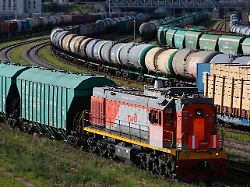Further measures against Russia
EU takes action against sanctions loopholes
6/21/2023, 4:56 p.m
Refrigerators, printers or pocket calculators from Europe: Products like these are sometimes delivered to Russia via third countries, where their electronics are used for weapons. With the now eleventh package of sanctions, the EU wants to put a stop to this. A third country gets special treatment.
The EU countries have agreed on a new package of sanctions against Russia. It includes punitive measures against other people and organizations that support the Russian war of aggression against Ukraine, but also an instrument against circumventing sanctions that have already been imposed, as the Swedish Council Presidency announced in Brussels.
The agreement was reached in the Committee of Permanent Representatives of the Member States to the EU in Brussels. It now has to be accepted by the EU countries. However, this is considered a formality. Among other things, the plans provide for the possibility of restricting selected exports to certain third countries due to suspected circumvention of sanctions. Many products from the EU countries themselves have not been allowed to be delivered to Russia for months.
Examples of countries used to circumvent sanctions against Russia include Kazakhstan, Armenia, the United Arab Emirates and China. Turkey was recently certified by EU experts to react comparatively decisively to indications of sanctions being circumvented. The EU has its sights set on refrigerators, printers and pocket calculators from Europe that are delivered to Russia via third countries and whose electronics are used there for weapons. As a “last resort” against circumventing the sanctions, a new emergency instrument is therefore planned, with which exports to non-cooperative third countries can be restricted.
The package also provides for entry and property freezes against 71 other responsible persons and 33 organizations. The EU accuses them, among other things, of taking part in the “illegal deportation of Ukrainian children to Russia”.
Beijing protests – Brussels reacts
EU Commission President Ursula von der Leyen welcomed the agreement on what is now the eleventh package of sanctions. It will deal another blow to the war machine of Russian President Vladimir Putin with tightened export restrictions. It also targets institutions that support the Kremlin. “Our anti-sanctions evasion tool will prevent Russia from getting its hands on sanctioned goods.”
Regarding the previous sanctions against Russia, the Commission chief recently said that the EU export bans alone affect goods with a pre-war trade volume of around 50 billion euros per year. This corresponds to a share of 55 percent. The EU import bans on goods from Russia therefore affect 60 percent of pre-war exports with a value of around 90 billion euros.
Immediately after the proposals for the sanctions package were presented in early May, there were also lengthy discussions about whether individual countries should be pilloried if they are used to circumvent sanctions against Russia. The main reason for this was the concern of some countries that possible action against China could result in retaliatory measures and negative effects on trade relations.
The EU Commission originally wanted to include Chinese companies on the sanctions list that supply Russia with goods that can be used both militarily and civilly, so-called dual-use goods. According to diplomats, after sharp protests from Beijing, only three Russian companies based in Hong Kong are now listed.
